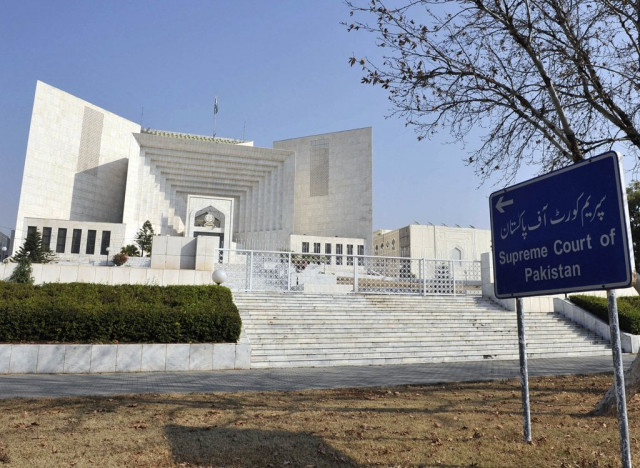Supreme Court divided on question of pre-arrest bail
Recent judgment in NAB case declares such bails ‘most extraordinary’ remedy

A recent order of the Supreme Court has brought to the fore the difference of opinion among the top court judges with regard to grant of pre-arrest bail in cognisable or non-bailable offences.
"Grant of pre-arrest bail in a cognisable/non-bailable offence is a remedy, most extraordinary in the nature of judicial protection,” said an order, authored by Justice Qazi Muhammad Amin Ahmed while hearing pre-arrest bail pleas in a National Accountability Bureau (NAB) case.
Justice Ahmed was part of a 3-judge bench also comprising Justice Mushir Alam and Justice Yahya Afridi.
“[This remedy is] extended by diverting the usual course of law for the sole purpose of protecting the reputation and honour of an innocent citizen, being hounded through abuse of the process of law for purposes sinister and oblique.
“The protection is based upon equity and cannot be extended in every run of the mill criminal case prima facie founded upon incriminatory evidence, warranting custody for investigative purposes.
“The protection was devised in Hidayat Ullah Khan’s case (PLD 1949 Lahore 1) and the principles laid down therein are being faithfully followed till date,” the order added.
The order clarified that grant of pre-arrest bail in a NAB case on condition of depositing an amount equivalent to the amount allegedly embezzled by a person has been declared ultra vires by the SC more than one time.
Also read: SC all set to define ‘enemy alien’
"An accused seeking bail desires transfer of his custody from superintendent of [a] jail, where he is confined, to his surety who undertakes his production as and when required by the court and for that he has to make out a case in accordance with the law applicable thereto; he cannot be allowed or required to barter his freedom.
"In the supra case considerations for grant of post arrest bail to an accused confronting charge under the NAB Ordinance have clearly been illustrated, therefore, an accused facing indictment in a NAB reference has to qualify the parameters set down in the supra case; there is no other way out," it added.
In a recent judgment, the SC had expanded the scope of pre-arrest bail, declaring that the power of the superior courts to grant such bails – first and foremost – must be examined in the constitutional context of liberty, dignity, due process and fair trial and as a check on police power.
"Pre-arrest bail is in the nature of a check on the police power to arrest a person.
“The non-availability of incriminating material against an accused or non-existence of a sufficient ground including a valid purpose for making arrest of the accused person in a case… would as a corollary be a ground for admitting the accused to pre-arrest bail, and vice versa," said a five-page judgment.
The verdict was authored by Justice Syed Mansoor Ali Shah, who, as a part of a three-judge bench also including Justice Manzoor Ahmad Malik and Justice Aminuddin, had granted a pre-arrest bail to an accused in a murder case. However, it is not clear if the same principle will apply to NAB cases as well.
The order said courts’ reluctance to grant pre-arrest bail and treating such a relief as an extraordinary one without examining if there is sufficient incriminating material to connect an accused with the offence and if arrest is required during investigation or trial does not appear to be correct.
The court also took exception to the courts’ insistence on showing mala fide on part of the complainant or the police for granting pre-arrest bail, especially after recognition of the right to fair trial as a fundamental right under Article 10A of Constitution of Pakistan, 1973.
It said protection against arbitrary arrest and detention is part of the right to liberty and fair trial.
"This court has, in many cases, granted pre-arrest bail to accused after finding that there are no reasonable grounds for believing in their involvement in the commission of the offences and has not required independent proof of mala fide on part of police or complainant before granting such relief."
The court said despite non-availability of incriminating material, his implication by a complainant and insistence of police to arrest him are circumstances which by themselves indicate mala fide on part of the complainant and the police, and the accused need not lead any other evidence to prove mala fide.
It noted that a police officer has – under Section 54 of the Code of Criminal Procedure (CrPC) – the power to arrest a person involved in any cognizable offence or against whom a complaint is made or credible information is received or a reasonable suspicion exists of his having been so concerned.
Also read: NAB chief silent on officers’ corruption: Supreme Court
"Having the power to arrest is one thing but the justification for the exercise of that power is quite another. A police officer who makes an arrest of a person must be able to justify the exercise of that power in making the arrest apart from his having the power to do so.
“He cannot make an arrest of a person only because he has the power to do so. He must also show sufficient grounds for making the arrest," said the order.
It is observed that Justice Qazi Muhammad Amin Ahmed, who has expertise in the criminal law, adopts a much stricter view regarding pre-arrest bail. This view is reflected in several of his judgments.



















COMMENTS
Comments are moderated and generally will be posted if they are on-topic and not abusive.
For more information, please see our Comments FAQ